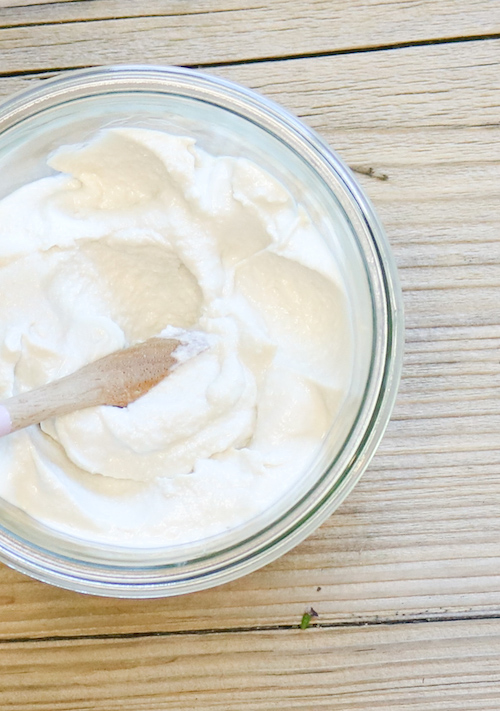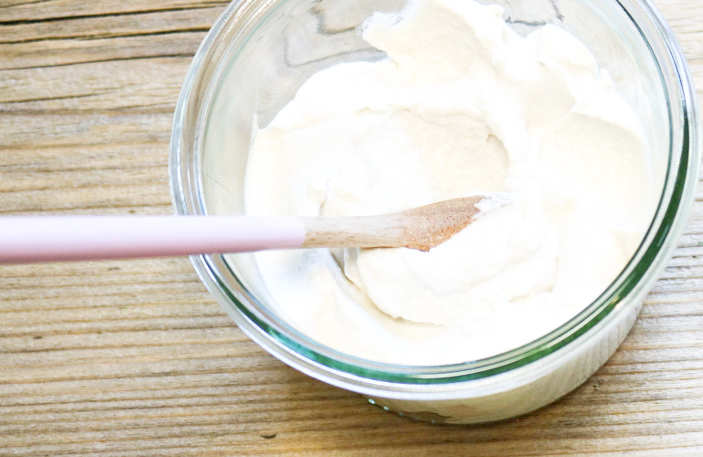This homemade raw vegan coconut cream is a true pleasure to enjoy: it’s delicious, melts gently on the tongue, and is especially easy to digest—thanks to its unique fatty acid composition.
Why Coconut Fat Is So Easily Digestible
The fat in coconuts consists mainly of medium-chain saturated fatty acids—especially lauric acid (approx. 48%), caproic acid, capric acid, and caprylic acid. These are transported directly to the liver via the bloodstream without detours and are primarily used for energy production. This is a clear advantage compared to long-chain fatty acids, which first pass through the lymphatic system before entering the bloodstream.
Another benefit: unlike cashew cream, which contains relatively high amounts of long-chain, unsaturated omega-6 fatty acids that may promote inflammation, coconut fat does not disturb the sensitive omega-6 to omega-3 ratio.
We love using coconut cream as a base for raw vegan cakes or as a topping for desserts—light, satisfying, and wonderfully creamy.
RAW VEGAN COCONUT CREAM
Ingredients
- 1 cup shredded coconut
- 1 cup water
- 1 tablespoon rice syrup or honey
- 3 tablespoons coconut oil (melted in a water bath)
- 1 tablespoon sunflower lecithin (emulsifier – brings water and oil together and provides a creamy consistency)
PREPARATION
- Blend the shredded coconut with water in a high-speed blender.
2. Strain the mixture through a nut milk bag, squeezing out all the liquid. You’ll be left with coconut milk and coconut pulp. The pulp can be dried and reused in another recipe.
3. Return the coconut milk to the blender. Add the lecithin, melted coconut oil, and sweetener if desired. Blend again briefly.
4. Chill the coconut cream in the fridge, ideally overnight. Depending on your fridge temperature, it can take up to 6 hours to firm up.
Note:
Coconut cream softens at room temperature—always serve chilled.
RAW VEGAN COCONUT SPREAD
INGREDIENTS
Same see above
PREPARATION
- Blend all ingredients together in a high-speed blender until creamy, then refrigerate.
- This version results in a slightly grainier texture but is extremely simple to make—and there’s no leftover pulp. You can also use a bit less coconut oil, as the consistency naturally firms up.

Are you interessted in gaining a comprehensive understanding of the health benefits of a plant-based diet? Download the curriculum for our Holistic Nutrition Coach training program.
What Does Lecithin Do?
Lecithin is an emulsifier—it binds water and oil, creating a smooth, creamy consistency. While some emulsifiers like carboxymethylcellulose or polysorbate 80 are controversial, pure sunflower lecithin is considered very healthy.
Sunflower lecithin contains a mix of phospholipids, which are essential building blocks of cell membranes and play a vital role in metabolism.
Why Nuts and Seeds Are Harder to Digest Than Coconut Fat
Nuts and seeds mainly contain long-chain unsaturated fatty acids. During digestion, these must first be emulsified with bile acids and then packed into lipoproteins—special transport particles—before entering the lymphatic system and eventually reaching the bloodstream and liver or cells. This process is more complex and slower compared to medium-chain fatty acids from coconut, which go straight to the liver and are quickly available for energy.
Moreover, nuts and seeds contain natural enzyme inhibitors and antinutrients, which can hinder nutrient absorption—especially when eaten unsoaked or inactivated.
The Importance of a Natural Balance
Our bodies need both saturated and unsaturated fats. However, modern diets often include an excess of long-chain omega-6 fatty acids—commonly found in sunflower oil, processed foods, and conventional snacks—while lacking in omega-3s and healthy saturated fats. The goal is to restore a more natural balance, with high-quality saturated fats and a healthier omega-6 to omega-3 ratio.
Practical Tips for Everyday Use
- Use coconut butter or coconut cream as a base for desserts, raw cakes, or smoothies
- Include omega-6-rich nuts and seeds in moderation, but regularly add flax, chia, or hemp seeds—e.g., in breakfast bowls or sprinkled over salads
- Avoid refined vegetable oils like sunflower oil, which are high in omega-6
- Choose high-quality olive oil (cold-pressed and stored in dark glass) for salad dressings
- Focus on natural, unprocessed fats—such as those in avocados, nuts, seeds, and coconut products
- Only heat oxidation-stable fats like coconut oil; avoid heating delicate oils
Recipe Idea
Would you like to join our unique, based on nutritional sciences and practice-oriented training program for gaining a high level of health?
We are more than happy to inform you about our training program on our website!






0 Comments